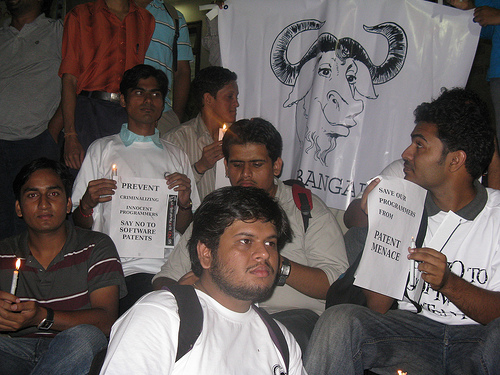04.03.13
Posted in America, Asia, Patents at 3:00 pm by Dr. Roy Schestowitz

Summary: Small businesses too — not just middle- and large-sized corporations — increasingly targeted by patent trolls and software patents; opposition to patent maximalism on the rise
The USPTO has been taking a lot of beatings recently. Many people from all around the world are berating and condemning the USPTO as well as key utilisers like Monsanto. SAP has been hit too, despite being based in Europe. The patent trolls went after American customers. To quote the British press, “SAP has moved to defend the users of its Sybase database software by filing suit against Pi-Net International, a “patent troll” that has filed several patent infringement lawsuits against SAP customers in the US financial services sector over patents it claims SAP is infringing.
“Pi-Net claims that SAP’s Financial Fusion software, used for online banking, among other things, infringes three of its software patents. SAP acquired the Financial Fusion product as a result of its 2010 acquisition of Sybase.”
Masnick’s site says that small companies too begin to realise the threat of trolls. To quote:
Startups Realizing That Patent Trolls Are An Existential Threat
Most people used to think that patent trolls tended to focus on bigger companies — those with huge bank accounts who’d rather pay the troll off than deal with a lawsuit. But over the last few years, we’ve been hearing more and more stories about startups hit by patent trolls, who are taking advantage of the fact that a patent lawsuit — win or lose — would almost certainly kill the company. One common tactic? Wait until a startup announces a round of fundraising and then pounce — knowing that the company (a) has some money and (b) has little time to deal with a lawsuit. Finally, this issue is getting some attention. Crain’s recently had a piece on patent trolls going “downmarket” after startups, which has some quotes from startup execs (many who want to remain anonymous to avoid further attacks).
Wired continues to have a lawyers-only debate about software patents. The latest comes from someone who was previously at the University of Miami (law) and there is still no call to abolish software patents. Here is a baffling statement:
Infringement of software patents is usually a good thing because in most cases the alternative to infringing is to produce nothing new. So, what if we could fix the patent problem by rethinking the assumption that infringement should always be penalized?
Another lawyer gets platform at Wired to say: “It’s become clear that the patent system is impeding, rather than incentivizing, innovation. The laundry list of what’s gone wrong is long: a standard for patentable subject matter that makes no sense, notoriously vague and hard-to-understand claim language, the rise of the patent trolls … and all of these problems disproportionately impact software.”
Yes, so why not call for the end of them all? Where are the software developers in this series of articles from the popular magazine? Do the editors at Wired even approach developers, or even science professors as opposed to law professors? Nope, hardly.
Speaking of controversial patents, there is some good news this week:
-
In a case closely watched by global drugmakers, Switzerland’s Novartis AG has been fighting since 2006 to patent its leukemia-treating drug Glivec in India on the grounds that it is a newer version. India revised its patent protection law in 2005.
-
India’s Supreme Court rejects plea from Swiss pharmaceutical giant, paving way for more affordable, generic medicines worldwide
-
The Australian government has released the draft report of its Pharmaceutical Patents Review, which had been tasked to “review the effectiveness of the Australian patent system in providing timely access to affordable pharmaceutical and medical treatments and supporting innovation.” The report considered domestic law on patents, data exclusivity, and pharmaceuticals, as well as Australia’s current trade obligations and its position in ongoing trade negotiations.
-
India’s Supreme Court on Monday rejected a Swiss pharmaceutical company’s effort to patent an updated version of its cancer drug, a decision aimed at boosting a domestic generic drug manufacturing industry that supplies cheap versions of lifesaving cancer and HIV medicines for much of the developing world.
We wrote about Novartis in [1, 2, 3, 4]. Through proxies specialising in PR, Bill Gates and his friend Nathan Myhrvold love to prop up international monopolies of such companies; they help disguise clinical trials (at the expense of fragile populations) as ‘charity’, never mind the truth of the matter. Slashdot has become a pathetic wuss for helping Myhrvold whitewash himself today. Who on Earth thought this would be a good idea? There are PR talking points all over the place, as we expected right from the start.
Patents that help cause death or limit access to cures based on one’s personal wealth are not ethical. They might even be more harmful than software patents and patents on seed DNA, which India will hopefully squash just like Novartis patents. █
Permalink
 Send this to a friend
Send this to a friend
03.24.13
Posted in Asia, Europe, RAND at 11:10 am by Dr. Roy Schestowitz

Summary: Negotiations over laws which can spread patent policy to more continents (other than America and to a lesser degree Australia)
We have been tracking the globalisation of the patent system for quite some time (this subject was covered here many times before) and also discussed in a high level of detail what was being done in Europe. Perhaps being a European-centric site is the outcome of yours truly being European, but in any event, the problem is global.
The USPTO, an instrument of US corporations of large size, wishes to expand its scope of monopolies not just in terms of how abstract a patent can be but also what geographical locations (scope) the patent becomes applicable in.
There is a lot of OS news from China these days, notably Microsoft bribery and a Ubuntu-based national operating system. But recently we wrote about China following the wrong path on patents and this page says that China is now talking about patents in standards, i.e. something like FRAND. To quote:
On March 7th, USITO and representatives of local and foreign trade organizations and companies attended a meeting co-organized by the Standardization Administration of China (SAC) and the China National Institute of Standardization (CNIS) to discuss comment submissions on the Regulatory Measures on National Standards Involving Patents (Measures).
Standards should involve no patents. It is as simple as that. To require patents to merely implement standards is to be anticompetitive. FRAND-type policies also tend to serve as opportunity for software patenting where such patents are not legal. There are other such loopholes, the unitary patent in Europe for instance. Glyn Moody wrote about it just the other day, complaining about lack of proper analysis of the impact on Europe.
In other words, despite all the grand talk about how wonderful the Unitary Patent would be for Europe, that’s only potentially true if most patents are issued to European companies. As the latest EPO report makes clear, it’s companies outside the EU that are increasingly being granted patents here. That means the EU has just created a powerful new rod for its own back that will allow US and Asian multinationals to gain patents more cheaply and sue local companies more easily. And given the US experience, we can be sure they will.
But those at the EPO needn’t worry: they’ll probably still get their patent inflation bonuses next year, regardless of the knock-on consequences for European businesses. Whether that will be much comfort if your company gets sued under the Unitary Patent scheme in the years to come is another matter….
The pursuit of software parents everywhere (through FRAND and other means of globalising patent tax) is definitely noteworthy. A lot of money flows in the direction of very few people and new, small companies are not permitted to compete in the market unless they can overcome patent thickets. █
Permalink
 Send this to a friend
Send this to a friend
03.11.13
Posted in Apple, Asia, Patents, Samsung at 6:11 am by Dr. Roy Schestowitz

Summary: Apple continues to find that patent wars against Linux/Android are getting it nowhere
Apple’s hype machine is losing its momentum as technically superior devices come out and outsell Apple’s best-selling products. Those devices have Linux in them.
Apple has been impeding development of some of the world’s technically best phones, the Galaxy S series. “Apple and Samsung,” writes Pamela Jones, “at the judge’s request, have filed their joint status report [PDF] on the theme of whether the judge should stay Apple v. Samsung II until after the appeals court rules on Apple’s appeal of Apple v. Samsung I. It’s a joint report, filed together, but they agree on nothing. Samsung says they should wait; Apple says they shouldn’t. Apple says that the two cases are distinct, with Apple II involving none of the same patents and “virtually none” of the same Samsung products.”
I happen to know some Apple fans who turned into Galaxy S fans. I met one of them yesterday. Even some prominent Apple people, such as Woz and Guy Kawasaki, seem to be walking away from the “i” hype.
Apple may be under some patent attacks, but the scale of the attacks which come from Apple is much greater. Samsung, responding to Apple’s aggression, tried to block Apple in Japan:
Samsung Electronics Co. (005930) failed in a bid to block sales of Apple Inc. (AAPL) iPads and iPhones in Japan, the latest step in a global patent spat between the world’s two largest smartphone makers.
The Tokyo District Court rejected the request as Samsung hadn’t negotiated “sincerely” with Apple over licensing data- sending patents, Judge Ichiro Otaka said in a ruling today. The court also ruled that Samsung doesn’t have the right to seek damages from Apple.
According to another recent report, “touchscreen gesture patents that Apple has accused Samsung of infringing on are not eligible to be patented in the first place, according to Samsung’s Australian barrister Richard Cobden.”
This case or set of cases between Apple and Samsung may help determine how quickly Android grows. In a new paper from Lemley et al. it is being claimed that trial length in patent cases has no effect on the outcome, which may be good news for several defendants in Linux-related cases. Here are some more findings:
We conduct a comprehensive study of all patent trials over the past eleven years. We find that juries are more favorable to patentees than judges, that (to our surprise) the length of a trial has no effect on its outcome, and that there are surprisingly modest differences between patentee win rates in favored jurisdictions like Delaware and the Eastern District of Texas.
Apple is desperate to carry on with this battle that Steve Jobs advocated for whereas the current CEO, based on reports, actually opposed. It has been a long time since Apple started this clueless patent war and Apple is barely getting anywhere with it. Apple is just getting distracted and it slows down. The US press, CBS for example, keeps posing Apple propaganda in the form of biased, flawwd statistics. The authors, some of whom used to serve the Microsoft press, fail to stall Linux growth. The latest of the Galaxy S series, the S4, is to be officially announced this week. █
Permalink
 Send this to a friend
Send this to a friend
01.04.13
Posted in America, Asia, Patents at 4:36 pm by Dr. Roy Schestowitz

Summary: Amid loss of edge in the innovative industries, a turn to patents is seen for PR and protectionism
The patent war is bound to get interesting now that the US loses its lead. The Economist says: “China’s patent office received more applications than any other country’s in 2011, according to the World Intellectual Property Organisation, a UN body which follows 125 patent offices.”
Suffice to say, those numbers don’t means much, but they are used for vanity purposes. The US will try to pass off more ideas as patentable. The USPTO is trying to manufacture consent for software patents right now:
There is a notice in the Federal Register that the USPTO would like to form a partership with the software community to figure out how to “enhance” the quality of software patents.
The more patents the USPTO approves, the more “innovation” it will claim. Here is the government’s bad stance and a new case study against software patents:
Why Software Patents Should Be Banned: A Case Study
Joe Mullin provides us with the latest in the patent troll wars. Last year, a guy named Steven Vicinanza, the founder of BlueWave Computing, got a letter from Project Paperless LLC telling him that he needed to pay $1,000 per employee because he uses networked scanners in his business:
That was Mother Jones.
Over at Bloomberg (plutocrats), the lawyers, or the 1% who are parasitical, have their say. To quote: “Clearly I didn’t ask enough patent attorneys for impressions of what’s going on in their corner of the cyberlaw world. There is a lot going on there. Complaints about how the patent system is impeding innovation, complaints about the complainers about the patent system, a new unified patent system in the European Union and a new court to keep things unified (that’s a lot of uniformity!), a new way of evaluating patents on business methods ushered in by the America Invents Act, and another big case in Federal Circuit involving a the patentability of computer software.”
Don’t ask patent lawyers. Ask real stake holders, people who actually produce something. █
Permalink
 Send this to a friend
Send this to a friend
12.15.12
Posted in America, Asia, Patents at 12:07 pm by Dr. Roy Schestowitz

Summary: India enjoys abundance, whereas the US lets corporations create scarcity that kills people and also suppresses startups
A new post from a startup person, not a lawyer pretending to represent startups, explains why software patents are a “nightmare”. This is becoming a trend; in fact, whenever it’s a non-lawyer writing on the subject the outcome is the same.
In a video we posted very recently about Apple patents that can make one cringe it is easy to see where USPTO failed. Masnick shares such videos:
We’re hearing more and more talk about how broken the patent system is, and recently came across a pair of videos we figured some of you might enjoy. The first is a comedic riff on Apple’s recent page turn design patent, leading Ron Charles to post an amusing video of how Apple might explain its patenting of “letters”
These had an impact on other influential sites in the US. They are turning against their patent system.
Masnick’s American site watches with envy what India is doing:
Getting rid of the first modern drug patent in this way neatly symbolizes the country’s aggressive new attitude to Western-held monopolies on medicines. It’s interesting that in this case the opposition came not from the Indian government, but from Sankalp Rehabilitation Trust, a non-governmental organization, which hopes to source the drug from a manufacturer of generics cheaply enough to be able to give it away for free. This may well inspire post-grant opposition from other organizations seeking to provide cheaper drugs to the sick in India through the use of generic versions.
My mother revealed to me last week that those generics give India a huge advantage and distribution worldwide is only impeded by draconian patent laws (barring import), which are artificial barriers or protectionism.
Patent-hostile site IP Watch also covered it:
India last week saw a landmark public health decision on the evolving role of intellectual property rights in the context of the public interest.
The country’s Intellectual Property Appellate Board (IPAB) revoked a patent granted in India to F. Hoffmann-La Roche AG (Roche) for pegylated interferon alfa-2a (Pegasys), a medicine used to treat Hepatitis C.
Attempts to push software patents into India were made some years ago, but the population there seems to be sufficiently informed and eager to fight back against multinationals. No wonder India is booming. Even software development goes there. When did we last hear about patent trolls or even patent lawsuits involving software in India? In Europe, the situation has not been too bad, either, but Richard Stallman warned about 7 years ago that letting software be patented in Europe would give advantage to patent aggressors outside of Europe. So-called ‘free trade agreements’ (or similar treaties) try to globalise patent regime (i.e. extend scope of monopoly). Passage of those relies on keeping the population in the dark because that’s a disgrace which is only good for multinational corporations. █
Permalink
 Send this to a friend
Send this to a friend
12.05.12
Posted in America, Apple, Asia at 2:33 pm by Dr. Roy Schestowitz

Summary: Apple’s imperialistic behaviour to enjoy no backroom treatment anymore
A while back we wrote about Apple’s inability to keep extortion secret (the HTC case). Based on this analysis, only the extortion fee (if any) will stay secret:
The judge in the Apple v. Samsung case, the Hon. Lucy Koh, has just ruled that the HTC-Apple license agreement that was signed on November 11 will be made public, the only exception being the pricing and royalty terms, which will be sealed. Samsung’s lawyers have already gotten to see them, but we won’t. But we will get to see the list of patents covered by the agreement. If the patents on the list are the same patents as in this case, it will make it much easier for Samsung to avoid an injunction. As you just saw in the Microsoft v. Motorola case in Seattle, if money can make you whole, you normally can’t get an injunction. And if they aren’t, there is a Samsung argument that customers don’t care about those features enough to pay for them, which could impact the damages figure. This will be part of what is discussed at the hearing on the 6th.
A lot of this is the result of software patents, which Apple hopes to take global (India’s policies on patents, suggests this new article, still appears to be influenced by the software patents lobby). Why do companies from Taiwan and Korea need to bow to US courts and play by the rules of some bureaucracy known as USPTO, run by an American cartel of multinationals? Is Asia now a US colony? These phones are all made in Asia, even though Apple is trying to USA-wash the hypePad with labels like designed and assembled (boxed?) in USA, based on a report from last week. █
Permalink
 Send this to a friend
Send this to a friend
10.21.12
Posted in Asia, GNU/Linux, Google, Hardware at 10:44 am by Dr. Roy Schestowitz

Summary: Windows is having a hard time getting bundled with tomorrow’s hardware, suggest reports
The Vista 8 crisis and the collapse of the Windows monopoly sure affect OEMs. They are turning the other way and citing this report, BGR says:
Microsoft’s Surface tablet continues to ruffle feathers ahead of its imminent launch next week. According to a report on Friday from Digitimes, Microsoft’s partners feel their software supplier “will no longer be concerned about its downstream partners’ thoughts or complaints” following the launch of the Redmond, Washington-based company’s debut tablet. Instead Microsoft is focused on establishing its own hardware business and breaking into the tablet market that has eluded it thus far.
This is driving many companies to Android and GNU with Linux, e.g. ChromeOS or Ubuntu. Benioff says that this is the end for Windows [1, 2]:
Microsoft’s upcoming Windows 8 will mark “the end” of the computer industry’s dominant OS due to increasing competition and choice sparked by alternatives, Salesforce.com CEO Marc Benioff predicted Friday.
Windows 8 is a catalyst or “gambit” for CIOs, forcing them to say “am I going to Windows 8, or am I going to something else,” Benioff said during a question-and-answer session at Salesforce.com’s Cloudforce event in New York, which was webcast.
There is already fragmentation in Windows, not just in Windows file systems, and in turn this removes the inertia/advantage of applications compatibility. Hardware became a game changer. “Windows RT does not support running XNA applications,” quotes Patrick from Techrights. “You can still write an XNA game for Windows 8, but it won’t run on the Windows RT devices.”
“Microsoft,” he writes, “meet thy iceberg!”
There are other issues emerging:
Some claim confusion by consumers may have killed off GNU/Linux on netbooks. What will “8″ and “not 8″ do for WARM? I certainly cannot tell them apart from the “notStarting Up” and the “notStart” screens. I think */Linux on ARM is safe for now. I wonder if x86 is safe from GNU/Linux though? Consumers who will buy a PC with rectangular regions of the screen with widgets may well prefer it. If I were a retailer, I would stock up on GNU/Linux PCs just in case consumers run away from “8″.
We are at the cusp of change. The client side will soon be dominated by Linux.
Intel and Microsoft are so scared of ARM/Linux that they play dirty again, according to a blogger in Asia who writes:
As a government agency, SKMM has no rights in determining which software vendor’s solution should be used. Interestingly enough, it does not prescribe a preferred broadband service provider – which is the way it should be done.
The tender stinks of suspicion, especially looking at Microsoft’s poor records in using underhand tactics to promote it’s products. See for example, Microsoft’s indirect lobbying against OpenDocument Format (ODF) back in 2008, in Malaysia and the Phillipines.
Interestingly enough, Microsoft’s annual report declares how much of contribution to politicians it gives, down to individual House of Representatives and Senators’ names. Surely it can do the same on lobbying on a per-country basis?
Something similar happened in Thailand [1, 2, 3]. █
Permalink
 Send this to a friend
Send this to a friend
07.20.12
Posted in Asia, GNU/Linux, Microsoft at 11:39 am by Dr. Roy Schestowitz
“Analysts sell out – that’s their business model… But they are very concerned that they never look like they are selling out, so that makes them very prickly to work with.”
–Microsoft, internal document [PDF]

Summary: Update on the situation in Russia and the role played by Microsoft-funded ‘analysts’
THE salesmen from IDC (dressed up as “analysts”) and the Gartner Group might have to finally admit that those ‘studies’ Microsoft buys from them are a sham. In his personal blog, one Gartner chum calls Vista 8 “bad”. Yes, even the Microsoft- and Gates-funded Gartner has its analysts say about Vista 8: “In a word: Bad.” It’s not an official position, as Microsoft typically pays them to just say what Microsoft pays them to say.
This makes one wonder. Why don’t more governments and businesses move to GNU/Linux? For one thing, Microsoft’s goons from Gartner (people like Silver) discourage this, as we last showed some days ago. Well, as we also showed before, in Russia-centric wiki pages for example, there has been a lot of funny business and misconduct. While Putin said that Russia would move to GNU/Linux within several years, his colleague Medvedev was meeting Microsoft and it is alleged that Russia is dumping GNU/Linux. To quote a Russian blogger:
The winner of the tender was the company PingWin Software, owned by… Leonid Reiman. What was the distribution they offered? It was… face-lifted Mandriva! Yes, you read it right. The prototype of Russian National Software Platform, due to be used in Russian state-owned organisations and in schools, was French! At the same time, Russian teams like ALT Linux or RBK-Soft (currently Armada), were left outside. Is it just a coincidence that the investment fund NGI, which manages the money of Mr.Reinman, partially owns Mandriva too?
That was actually only half of the trouble. The fate of Russian Government, including the Ministry of Defence, could be given to foreign (French) developers. But, at least, that could be an open-source product based on open source principles.
Things actually got worse since February 2012. Many changes happened in Russian politics since that time. The most famous of them was a castling between the President and Prime Minister. Ex-president Medvedev is now a Prime Minister, and ex-President ex-Prime Minister Putin is now a President again.
Mr.Medvedev made significant changes in the Cabinet. One of the most notable was the appointment of 29-year old Nikolay Nikiforov as a new Minister of Telecommunications.
Less than a month after the appointment of the new Minister, the curator of the National Software Platform Ilya Massukh resigned. This is how he explained his resignation: Mr.Nikiforov thinks that National Software Platform is futile and has no future. Instead, Mr.Nikiforov suggests getting proper discounts for… Microsoft software! As first steps in this process, Mr.Nikiforov has already taken part in talks with Microsoft representatives during the Saint-Petersburg Economic Forum in early June.
[...]
Why does Mr.Nikiforov like Microsoft so much? The possible reason is that this is not his first acquaintance with this company. He has his photo published on the Microsoft site in one of the press-releases. Nikolay Nikiforov helped to translate Microsoft Windows 7 and Office 2010 to Tatar language while being regional Minister of Telecommunications in the Russian region of Tatarstan. Old roots are growing bigger, obviously.
ALT Linux complained about IDC helping Microsoft derail deployment of GNU/Linux in Russian schools. We never forgot this. █
Permalink
 Send this to a friend
Send this to a friend
« Previous Page — « Previous entries « Previous Page · Next Page » Next entries » — Next Page »

























 Content is available under CC-BY-SA
Content is available under CC-BY-SA